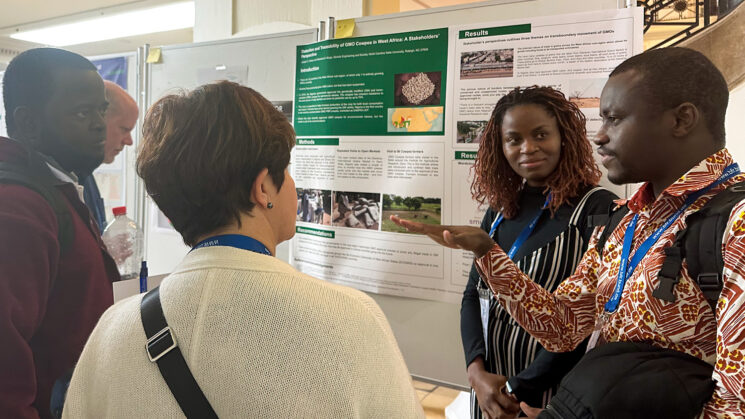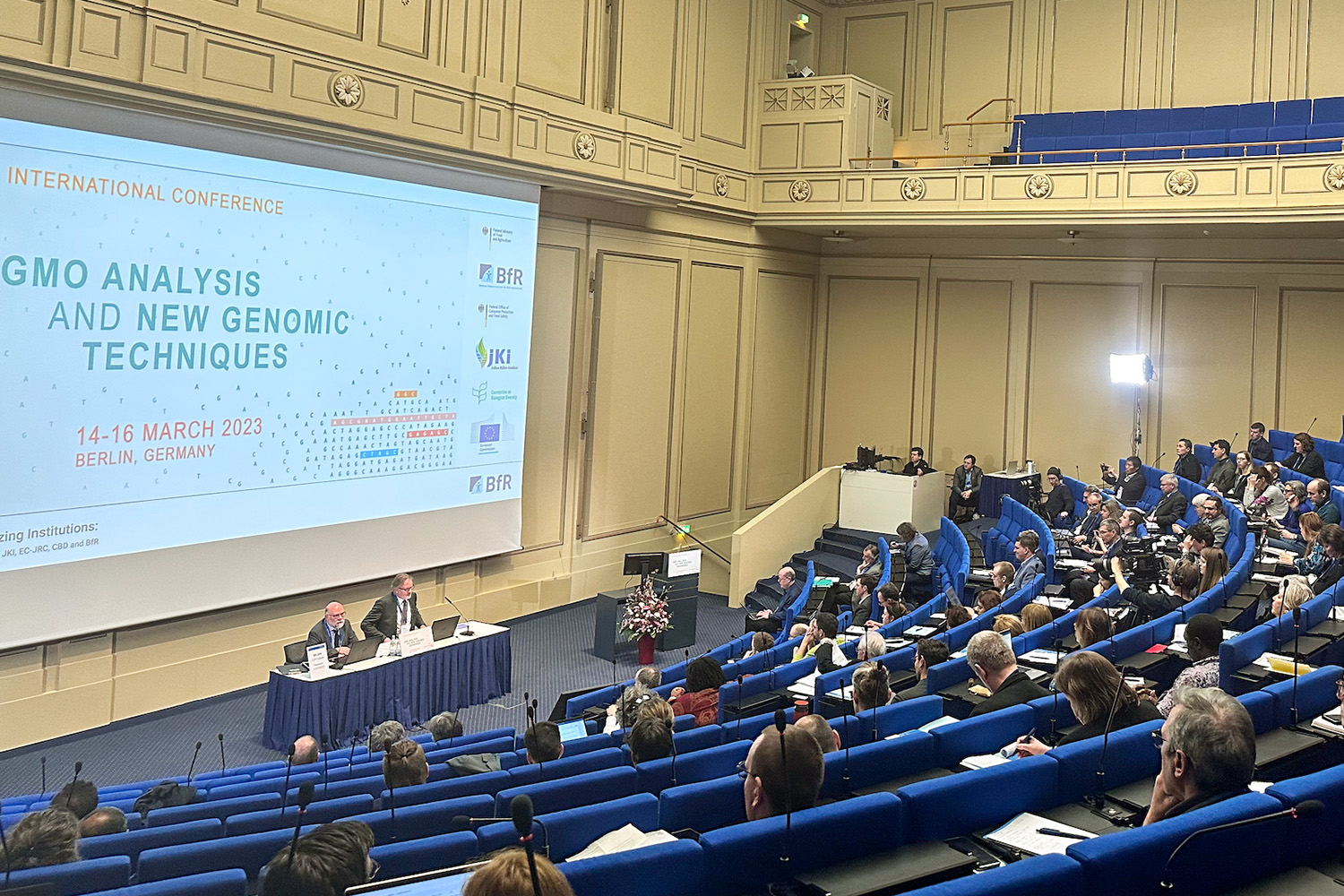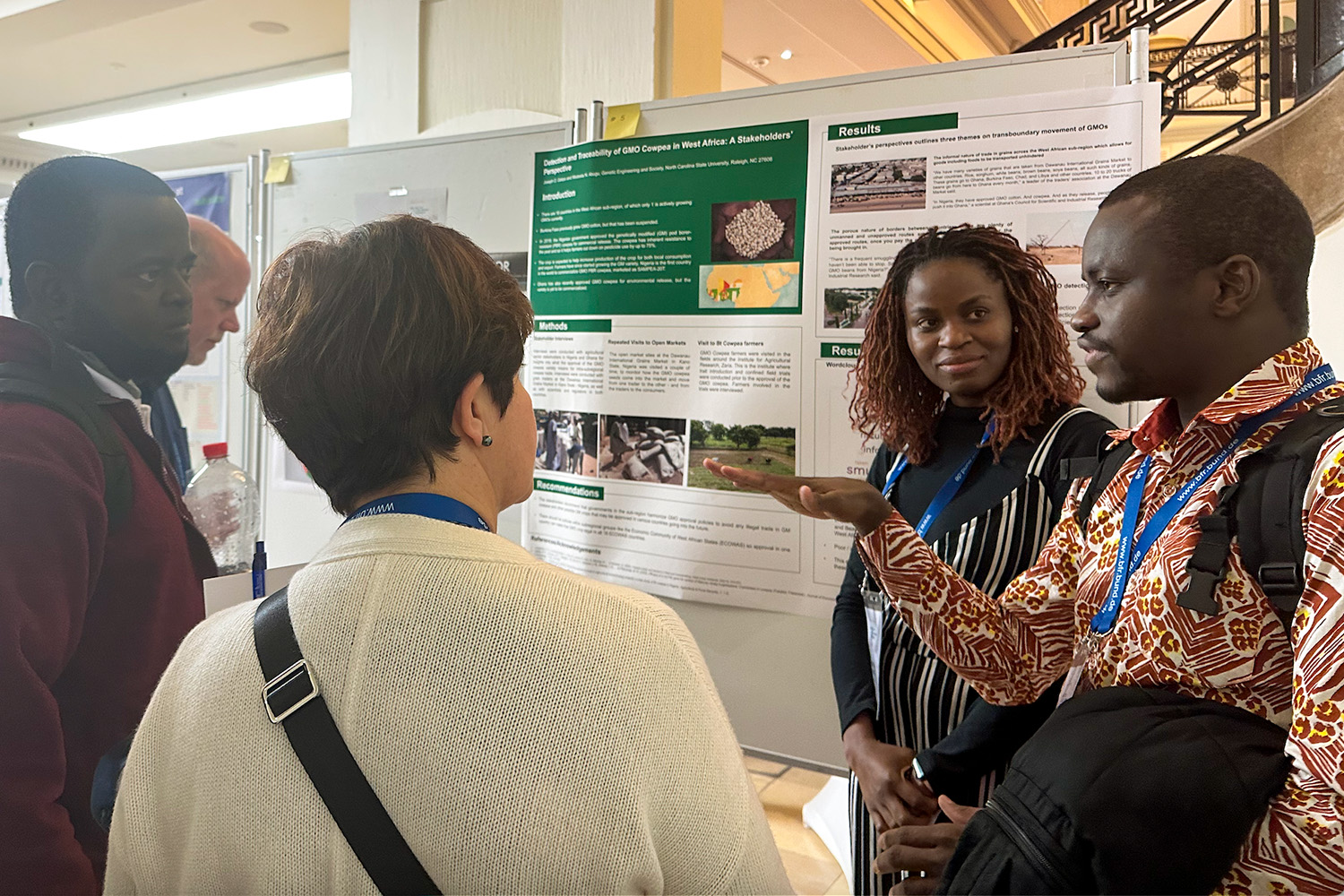

Opening remarks at the ‘International Conference on GMO Analysis and New Genomic Techniques’ in March 2023. Credit: Joseph Gakpo and Modesta Abugu
*Note: The opinions expressed in this article are those of the authors as individuals and should not be taken as a reflection of the views of the whole of the Genetic Engineering and Society Center or NC State University.
WRITTEN BY: Joseph Opoku Gakpo and Modesta Abugu
The traceability and detection of biotech foods in a globalized system remain crucial, and while detection methods have improved, many challenges remain, especially for products of new genomic methods like CRISPR.
In a world interconnected by a thriving international trade system and cross-continental movement of food, the traceability and detection of biotech foods remain an important issue.
While more than 90% of corn and soybean produced in the USA are genetically modified or genetically engineered, along with a host of other popular GM crop varieties, Europe appears hostile to the technology. The European Union says its GMO policy “respects the consumer’s right to know by ensuring clear labeling and traceability of GMOs.” Products that contain more than 0.9% of genetically modified ingredients must necessarily be labeled as “containing GMO” so that those who buy can make appropriate decisions on whether they want them. In the absence of appropriate methods for the identification, detection, and tracing of GMOs, this policy cannot be appropriately implemented.
Specific GM crops have been approved in about 70 countries worldwide. But food gets exported among all the approximately 195 countries globally. The movement of products across these countries needs to be properly monitored and regulated.
Since its establishment about 15 years ago, the Non-GMO Project has embossed its logo on more than 60,000 products in the USA. The people buying these products labeled non-GMO need to be clear in their minds that what they are purchasing are non-GMOs. Hence, the need for testing and traceability.
GM crops are estimated to have added almost a billion tonnes of food, feed, and fiber to the world’s available stocks between 1996 and 2020. Over this time, GM technology was reportedly responsible for the additional global production of 330 million tonnes of soybeans, 595 million tonnes of maize, 15.8 million tonnes of canola, and 1.9 million tonnes of sugar beet, among others. All these products must be appropriately accounted for in the food system. Again, this will not be possible without GMO testing and detection.
With more GMO products getting to the market and an increasing number of genome-edited products undergoing the necessary regulatory approval for commercialization or exemption, more attention is being paid to how such products can be appropriately detected.
The detection methods for GMOs and products of new genomic techniques like genome editing were the subject of a recent conference in Berlin, Germany, that we attended. Regulators and scientists from Europe, the USA, Africa, and other continents participated, and we were there as Agricultural Biotechnology in Our Evolving Food, Energy, and Water Systems (AgBioFEWS) Fellows. The International Conference on GMO Analysis and New Genomic Techniques was organized by the German Federal Ministry of Food and Agriculture, a number of other German national organizations that do biotechnology-focused work, the European Commission Joint Research Center, and the Secretariat of the Convention on Biological Diversity. The conference provided an opportunity for scientists and regulators to deliberate on recent developments in the fields of detection and identification of GMOs and products of new genomic techniques. It sought to promote broad technical and scientific exchange between scientists worldwide on the status and challenges for traceability, detection, and identification of GMOs and products of new genomic techniques.
The conference discussed analytical methods for the detection and identification of “classical” GMO and new genomic technique products, targeted methods in detecting single nucleotide variations carried by gene-edited plants, and tracking of CRISPR/Cas mutations in crops with complex genomes, among others. The conference acknowledged that innovation has improved scientific and technical methods for the detection of genetic modification products, as well as products of new genomic techniques. However, there are many challenges that will make it more difficult to detect products of new genomic techniques, such as CRISPR/Cas9. Some of the products of these new genomic techniques may exist in nature, making their detection more difficult.
Consumer Choice
Traceability, identification, and detection are crucial tools to help ensure consumer choice and the harmonious coexistence of products of both biotechnology and conventionally produced foods. As the GE Crops report by the National Academies of Sciences, Engineering, and Medicine said in 2016, there was “no substantiated evidence that foods from genetically engineered crops were less safe than foods from non-genetically engineered crops.” But consumers should still be free to stay away from GMOs if they want, and consumers who want GMOs should be able to choose exactly that. That is only possible with the appropriate methods of detecting and tracing GMOs. Also, traceability is important so that regulators can properly monitor these crops. As one of the scientists said at the conference, “It’s not about whether GMOs are good or bad. It’s about how to regulate them.”
Our Poster
We presented a poster at the conference titled “Detection and Traceability of GMO Cowpea in West Africa: A Stakeholders’ Perspective.” In West Africa, Nigeria is the only country out of 16 nations where farmers are commercially growing GMOs (specifically GMO cowpea), while Ghana recently obtained approval for the environmental release of the variety. However, most African countries have an open market trading system, freely importing and exporting commodities like food without any restrictions.

Joseph Gakpo and Modesta Abugu presented their poster “Detection and Traceability of GMO Cowpea in West Africa: A Stakeholder’s Perspective” at the International Conference on GMO Analysis and New Genomic Techniques. March 2023.
We predict that in the future, unauthorized GM cowpea from Nigeria will move to other countries in the sub-region due to the informal nature of trade in grains across the West African sub-region, which allows for foods to be transported unchecked. Again, it’s not about the product being good or bad. It’s about regulation. We recommended that governments in the sub-region properly harmonize GMO approval regulations to avoid any such unauthorized trade in GM crops.
Some scientists from the sub-region we met at the conference shared this concern too. They wondered why little attention has been paid to testing regulations and procedures on the continent. “Looking at the advancement made in other parts of the world (in detection and traceability), it looks like we are very late in Africa. So, I think we have to wake up,” said Dr. Francis Djankpa, senior lecturer at the Department of Physiology, School of Medical Sciences, University of Cape Coast.
Prof. Stephen Ghogomu of the Department of Biochemistry and Molecular Biology at the University of Buea in Cameroon agrees. “We will need the expertise back home to be able to carry out the work on monitoring and detection… It is possible for us to seek out research grants to carry out these diagnoses using new technologies in collaboration with other laboratories, which are well established abroad… But we need local resources,” he said.
All countries across the world need to take an interest in the traceability and detection of biotech foods locally produced and imported if the full potential of these technologies can be realized for the benefit of mankind.
Modesta Nnedinso Abugu (@modestannedi) is a PhD student in the sweetpotato breeding and genetics program, under the supervision of Dr. Craig Yencho and Dr. Massimo Iorizzo. Her research seeks to understand the genetic mechanism of interaction of various sweetpotato flavor compounds. She is passionate about communicating science to the public, especially on the potentials of agricultural biotechnology tools in promoting food security, and also interested international regulation of biotech crops. She obtained her masters degree in Horticultural Science from the University of Florida, and BS in Biochemistry from the University of Nigeria Nsukka. She can be reached at mnabugu@ncsu.edu .
Joseph Opoku Gakpo (@josephopoku1990) is a PhD student in Agricultural and Extension Education at the Department of Agricultural and Human Sciences, NC State University. His research interests include: communicating controversial sciences like GMOs, vaccinations, and climate; factors that influence success in agricultural education; and how communication is shaping global philanthropic efforts to reduce poverty. He holds a Bsc in Agricultural Biotechnology from the Kwame Nkrumah University of Science and Technology in Ghana, an MA in Communication Studies from the University of Ghana, and a Master of Arts in Liberal Studies from NC State. He is a journalist by profession and is the 2018 International Federation of Agricultural Journalists’ Best Video Journalist Star Prize Award winner. He was also a 2016 Global Leadership Fellow with Cornell University’s Alliance for Science Program. He can be reached at jogakpo@ncsu.edu.
Related GES Colloquium with AgBioFEWS Fellows, “Has the UN Biodiversity Convention been a force for ‘good’ or ‘evil’ in how biotech crops are regulated globally?” January 17, 2023